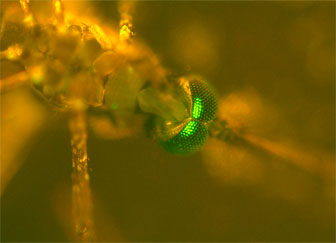DEET repellent works by blocking human odor from mosquitoes
DEET repellent works by blocking human odor from mosquitoes
mongabay.com
March 13, 2008
|
|
DEET, a potent insect repellent, works by blocking the aroma of human sweat, report researchers writing in the journal Science. The discovery could lead to the development of new repellents that have fewer health risks.
While scientists have long known that mosquitoes are attracted to body odor and carbon dioxide, it has been unclear exactly how chemicals like DEET deterred blood-sucking insects. Now, by pinpointing DEET’s molecular target in insects, researchers at Rockefeller University have shown that the repellent masking human odors that attract mosquitoes and other blood-feeding insects.
“Mosquitoes are strongly attracted to odors in human breath and sweat, including carbon dioxide, lactic acid and an alcohol-based compound called 1-octen-3-ol. Different receptors within their olfactory system detect these odors, among others, and lead them to their prey,” explained a statement from Rockefeller University. “DEET simply interferes with the proper functioning of odorant receptors, making the hunt for a tasty meal all the more difficult.”
 A transgenic mosquito carrying a gene that confers resistance to the malaria parasite. The mosquito can be recognized as transgenic by the green fluorescence of the eye facets. From Mauro T. Marrelli et al (2007) |
Vosshall says DEET doesn’t shut down the entire olfactory system. “Instead, it seems to shut down strategically different parts of it. It just shuts down enough of these receptors to confuse the mosquito or blind it to the odors it finds attractive.”
DEET is recognized as the most effective insect repellent but there are lingering concerns over its health effects. Vosshall says the discovery of how DEET works “is the first step in making significantly better insect repellents.”